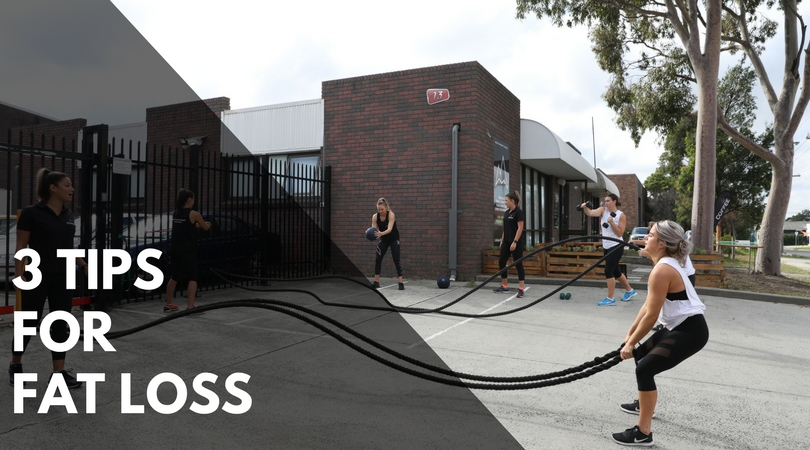3 Tips For Fat Loss
Fat loss can be a very confusing topic for lots of people especially with the amount of free information out there today. Many questions continually tend to pop up such as:
- What foods do I eat?
- When do I eat these foods?
- How much food do I eat?
- How often do I eat?
- How often do I train?
- What type of training should I do?
and many many more… DISCLAIMER: most of the time it’s dependent on the individual. However, the three tips im about to give you, I am just speaking in general terms for everyone to give them a starting point.
1) Eat in a Caloric Deficit.
What is a caloric deficit? It means you are consuming fewer calories than your body burns. When you are eating less and increase your activity level, your BMR increases. When you increase your BMR and consume less energy than what you expend then you are in a caloric deficit. A deficit can be created by consuming fewer calories. This is where fat loss happens when you are in a deficit/having fewer calories then what you consume.
All of these significantly affect your Basal metabolic rate (Which is how much energy you expend at rest). For example, if your daily calorie intake is 2000 a good starting point is to eat about 10-15% less. e.g. -200 calories per day so total calorie intake now is 1800. Why so small? The reason we don’t put our clients on massive restrictions is that if it’s too big of a restriction, our clients and 90% of people will not adhere to the program.
A nutrition plan/program should be enjoyable and flexible by the client so that they can go out in social events and enjoy life and get the results they want. Start with baby steps and if you find your constantly getting results (use images or clothing as the best guideline) then don’t change a thing. If you are beginning to plateau then you can think about restricting more calories. It’s important that you don’t restrict yourself massively because if you can actually gain fat if you restrict yourself too much.
Plus you’ll also be super hangry all the time and most likely snap at family, friends, co-workers and most importantly you will start to develop an unhealthy relationship with food. There are many other factors that come into play with a fat loss such as
- Physical activity level (PAL) which is how often you exercise.
- Thermic effect of food (TEF) amount of energy needed to digest, absorb and process the foods you eat.
- Non-exercise activity thermogenesis (NEAT) this is how much energy you expend doing daily activities such as walking to the copy machine at work, doing the dishes or cleaning the house.
***These will be explained in detail in another blog.
2) Portion size.
If you’re not experiencing fat loss or weight loss for that matter, it’s more than likely you are eating too much, too often. Or you’re just not eating the right foods. You can still eat 5 meals per day if you prefer, or you can eat 3 meals if you prefer.
If your goal is fat loss and you don’t want to count calories then a good place to start is to reduce your portion sizes and fill your plate with more vegetables (as these are low in calories). Most people are completely unaware of how many calories are in foods and are unaware of how much they eat, especially when everyone’s favourite foods such as bread, chips, cheese, alcohol and take away foods which contribute to a lot of peoples caloric intake. One way to reduce your caloric intake is to replace junk foods or carbohydrates with a serving of vegetables. So, what’s a good serving size? Here’s a good infographic from precision nutrition that we like to give our clients: 
3) Protein intake.
Many people simply don’t get enough protein intake. One tip we give all our clients at TWM is to get a source of protein (plant or animal based) each meal you have. In some cases people actually eat too much, we actually don’t need as much as you think, it just needs to be a staple in each meal. Protein is essential for your body to grow, build (creating an anabolic environment) and repair muscle damage. It also repairs teeth, skin, bone, and hair. In any program, protein intake is probably one of the most critical element. It does much more than just ‘build muscle’, it also helps with burning fat as it helps carry haemoglobin (which is responsible for oxygen transport which is vital if your aim is to lose body fat). It also helps with your blood pressure, stabilizes blood sugar levels and keeps you fuller for longer. How much? For females, a good guideline is 0.8-1.2g of protein per kg of bodyweight and men can go a little more extreme, 1.2g to 1.5g of protein per kg of body weight. If you have any other questions or queries please don’t hesitate to message us! References: https://bit.ly/2HZuoVW https://bit.ly/2rntJr0 https://bit.ly/2IdDdz5 https://bit.ly/2rqNhtS

